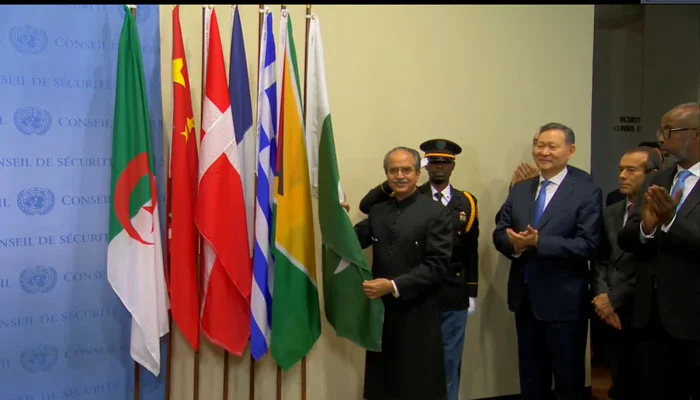- Web Desk
- Feb 19, 2026
Pakistan’s flag installed at UNSC as it joins as non-permanent member
-

- Web Desk
- Jan 03, 2025

UNITED NATIONS: Pakistan’s national flag was displayed outside the UN Security Council (UNSC) chamber on Thursday as the country began its eighth term (2025-26) as a non-permanent member of the 15-member council.
At a ceremony held at the UN Headquarters in New York, flags of the five new non-permanent members—Pakistan, Denmark, Greece, Panama, and Somalia—were raised. These nations replaced Japan, Ecuador, Malta, Mozambique, and Switzerland, whose terms ended on December 31, 2024.
Pakistan’s Alternate Permanent Representative, Ambassador Asim Iftikhar Ahmad, hoisted the national flag during the event at the UNSC. He reaffirmed Pakistan’s dedication to the principles of the UN Charter, emphasizing international peace, security, and friendly relations among nations.
Ambassador Ahmad highlighted Pakistan’s ongoing commitment to advocating for the rights of oppressed peoples and self-determination. He underscored the importance of multilateral cooperation, dialogue, and peacebuilding to address global conflicts and promote stability.
Pakistan is set to assume the Security Council presidency in July 2025, granting it the opportunity to influence the Council’s agenda.
Political stability key to economic development: PM
Additionally, Pakistan will take a seat on the ISIS and Al-Qaeda Sanctions Committee, responsible for identifying terrorists and imposing sanctions.
The UN Security Council, consisting of 15 members (five permanent and 10 non-permanent), is tasked with maintaining global peace and security. It holds the authority to make binding decisions, impose sanctions, and authorise the use of force.
The tradition of raising new members’ flags, introduced by Kazakhstan in 2018, marks the beginning of their terms.
Kazakhstan’s representative, Kairat Umarov, expressed confidence in the incoming members’ ability to address pressing global issues, including conflicts, humanitarian crises, climate change, and pandemics.




